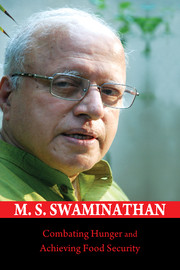Book contents
- Frontmatter
- Contents
- Foreword
- Preface
- Acknowledgements
- Abbreviations
- 1 Genesis and Growth of the Yield Revolution in Wheat
- 2 Our Agricultural Heritage
- 3 Shaping Our Agricultural Destiny
- 4 Thrust on Farm Revival
- 5 Nutri-farm Movement
- 6 Nutrition-sensitive Agriculture
- 7 Food Losses and Food Waste
- 8 Rice in Zero Hunger Challenge
- 9 Monsoon Management
- 10 Importance of Ecological Conservation
- 11 Caring for Ecology and Heritage
- 12 Conserving Biodiversity
- 13 Overcoming Hidden Hunger through Aquaculture
- 14 Biofuels – The Way to Go
- 15 Food Security
- 16 Vigilance for Sustainable Food Security
- 17 Food Security and Social Protection
- 18 Food Security and its Role
- 19 Sustaining the Livestock Revolution
- 20 Challenges in the Year of Science
- 21 Agriculture and Humanism
- 22 Fostering the Science of Science Communication
- 23 Olympic Move for Saving Children
- 24 Youth: The Agents of Change
- 25 Role of Women in Agricultural Production
- 26 Know-how to Do-how
- 27 From Bengal Famine to Right to Food
- 28 Financial Institutions and Fighting Food Inflation
- 29 Public Good Research in Agriculture
- 30 The Future of Indian Agriculture
- Bibliography
Foreword
Published online by Cambridge University Press: 18 December 2015
- Frontmatter
- Contents
- Foreword
- Preface
- Acknowledgements
- Abbreviations
- 1 Genesis and Growth of the Yield Revolution in Wheat
- 2 Our Agricultural Heritage
- 3 Shaping Our Agricultural Destiny
- 4 Thrust on Farm Revival
- 5 Nutri-farm Movement
- 6 Nutrition-sensitive Agriculture
- 7 Food Losses and Food Waste
- 8 Rice in Zero Hunger Challenge
- 9 Monsoon Management
- 10 Importance of Ecological Conservation
- 11 Caring for Ecology and Heritage
- 12 Conserving Biodiversity
- 13 Overcoming Hidden Hunger through Aquaculture
- 14 Biofuels – The Way to Go
- 15 Food Security
- 16 Vigilance for Sustainable Food Security
- 17 Food Security and Social Protection
- 18 Food Security and its Role
- 19 Sustaining the Livestock Revolution
- 20 Challenges in the Year of Science
- 21 Agriculture and Humanism
- 22 Fostering the Science of Science Communication
- 23 Olympic Move for Saving Children
- 24 Youth: The Agents of Change
- 25 Role of Women in Agricultural Production
- 26 Know-how to Do-how
- 27 From Bengal Famine to Right to Food
- 28 Financial Institutions and Fighting Food Inflation
- 29 Public Good Research in Agriculture
- 30 The Future of Indian Agriculture
- Bibliography
Summary
It is no accident that the ‘eradication of extreme poverty and hunger’ was first on the list of the United Nations’ Millennium Development Goals. Access to food and proper nutrition has a direct impact on our capacity to reduce child mortality, to enhance maternal health and even to boost primary school attendance – all of which were announced in the year 2000 as development priorities. Crucially, the ways in which we grow food are profoundly linked to our ability to ensure environmental sustainability – another Millennium Development Goal.
Few people have understood the urgency of tackling the complex challenge of global food security better than Professor M. S. Swaminathan. Few have advocated so effectively for the need to bring scientists, non-governmental organisations, global policymakers and local communities together to achieve the objective of a hunger-free world.
There are some staggering facts to consider. We know that the world's current food production is enough to feed its entire population one and half times. And yet, according to the UN's Food and Agriculture Organization, one in eight people suffer from chronic malnutrition. Meanwhile, more food is wasted per year in the developed world than is produced in the whole of sub-Saharan Africa in the same period. As many of the essays in this collection demonstrate, the main issue is not scarcity, but poverty and equality. And the answer does not lie in the increasing yields, but in improving them.
For decades Professor Swaminathan has campaigned for the introduction of enriched food crops, for a greater emphasis on nutrition-sensitive agriculture, for a more balanced integration of the world's food and energy security strategies, and for better communication between scientists and the public. In India, he is rightly acknowledged as the man behind the country's ‘Green Revolution’, which propelled the country to self-sufficiency in grain production in the 1960s. A more recent achievement is his influential role in the enactment of India's National Food Security Act (2013), which makes provision of nourishment for the country's poorest a legal entitlement.
But his continued and ever-developing thoughts on the questions surrounding food security, and his promotion of an ‘evergreen revolution’, point to the global scale of the challenge. While the effects of biodiversity loss and climate change are felt locally, the task of managing them has to be international, and concerted.
Information
- Type
- Chapter
- Information
- Combating Hunger and Achieving Food Security , pp. vii - xPublisher: Cambridge University PressPrint publication year: 2016
